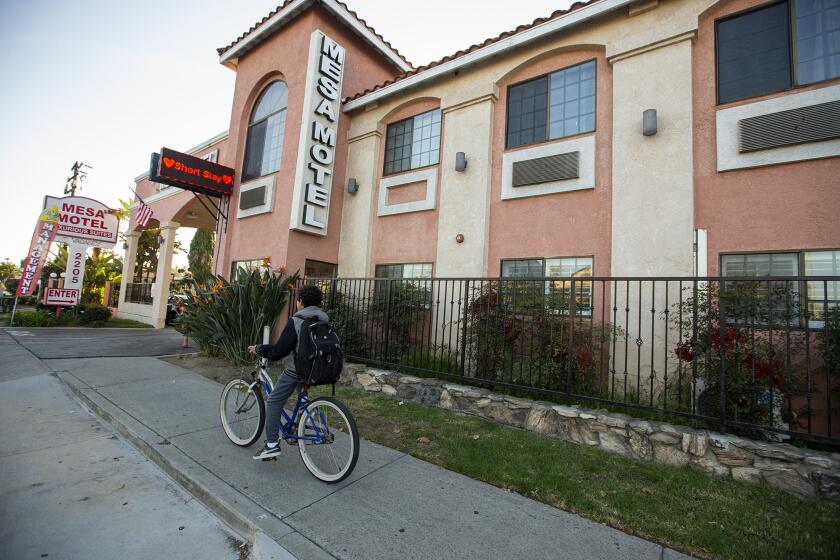Ron “Sleepy” Tripp, Millennium Hall of Fame
- Share via
When the discussion turns to Ron “Sleepy” Tripp, it has nothing to
do with a lack of shut-eye or feeling a little disorderly.
But if you followed Tripp’s unique career of prep football star, and,
later, midget auto racing legend, you’d find that the names fit
perfectly.
Tripp, inducted in 1986 into the National Midget Auto Racing Hall of
Fame in Marshall, Ind., got his nickname and his start in auto racing as
a youngster in quarter-midgets. He would fall asleep while seated in the
cockpit of his racer waiting for his next evening race to begin. He was 4
1/2 and his brother, Bob, who gave him the famous label, was 6.
Tripp tried to escape his nickname when he enrolled at Newport Harbor
High from Kaiser Junior High, where many of his classmates would attend
Costa Mesa.
“But I got stuck with it,” said Tripp, who won his 250th career race
last year (in four different countries) and is second on the all-time
victory list in U.S. Auto Club- sanctioned races behind A.J. Foyt.
A hero in New Zealand where midget racing is hugely popular, Tripp, in
his heyday, was often spotted on ESPN telecasts in the late 1980s, when
the all-sports cable network covered a lot of short track and midget
racing.
In his 26th year of midget racing, Tripp, 46, has been competing on a
limited basis since 1993. His last win came on July 31 at Bakersfield Speedway.
The youngest member elected to the National Midget Auto Racing Hall of
Fame at age 33, Tripp took the sport by storm when he captured three
straight USAC National Midget Championships from 1974 through ’76.
After several years on the national tour, which included 11 USAC
titles, Tripp (Costa Mesa) concentrated his efforts mainly on the Western
States Series, taking first or second every year but one from 1983
through ’93.
Born and raised in the area, Tripp lived next to the Indianapolis
Speedway from 1976 to ‘81, but moved back and got married a year later.
Tripp, who used to race 60 nights a year and now competes about 10
times a year, has been involved in 19 racing tours in the U.S., Canada,
Australia and New Zealand. His wife, Erin, is a native of Auckland, New
Zealand.
Tripp’s biggest victories include nine titles at the New Zealand
50-Lap Classic and two at the Belleville National Midget Championships
(1985 and ‘87), the top race in the U.S. at the time with a $10,000 prize
to the champion.
On Sept. 5, 1992, the Ventura Raceway paid tribute to him for 30 years
of racing (including his amateur years), providing fans with a special
souvenir program filled with photographs and highlights.
“I always knew I was going to get into midget racing; that’s what I
wanted to do,” said Tripp, who also spent three years racing motorcycles
in Southern California, and knew, for his size (5-foot-9, 180 pounds), he
would have no shot at the NFL.
But, before joining the fast lane, Tripp made his mark on the Long
Gray Line as a two-way football standout for the Tars in an unforgettable
season -- at the top of the trophy case, a prized win over then-vaunted
Anaheim.
Legendary former Anaheim Coach Clare Van Hoorebeke probably thought he
was on a bad trip when the underdog Sailors knocked off the high-powered
Colonists, 7-0, in Week 3 of the 1970 campaign, the Tars’ third straight
shutout to open the season and their first victory over Anaheim in seven
years.
Van Hoorebeke that night definitely experienced a Tripp throughout the
Sunset League upset, one which propelled Newport Harbor to its first
league championship since the Hal Sheflin days of 1942. Tripp was
everywhere that game, playing every minute at linebacker and offensive
guard.
Tripp, whose family has a long and rich history with Harbor football,
punched holes in Anaheim’s defensive line that night as the Sailors
rushed for 265 yards.
On defense, Tripp was the signal caller as the Tars bottled up the
potent Colonist attack, earning Player of the Week honors by three Orange
County newspapers, including the Daily Pilot and Los Angeles Times.
Small but mighty on the gridiron, Tripp went on to capture first-team
all-league, first-team All-Orange County and third-team All-CIF Southern
Section honors as a guard on Coach Ernie Johnson’s only Newport Harbor
squad.
Team MVP and co-captain with quarterback Alvin White, Tripp helped the
Tars (8-2) to their best record since 1949, when Coach Al Irwin’s team
was 8-1.
It was fitting that a Tripp played on the Sunset League
co-championship squad in 1970. His uncle, Don, was an All-CIF guard on
Newport Harbor’s last title team 28 years earlier. His father, Jerry,
played the same position in the late 1940s. And, in 1958, his uncle, Carl
Bergeron, was an all-star guard for the Tars.
Before Sleepy, his older brother, Bob, was a two-time all-county guard
who earned a football scholarship to Utah State.
But then Sleepy made his own history in 1970, sparked by the Tars’
victory over Anaheim, which entered the game having lost to Harbor only
once in the past 16 meetings.
Tripp was later selected to play in the Shrine Game at the LA
Coliseum, then played his final prep game on July 31, 1971, at the Aloha
Bowl in Hawaii for the California-Hawaii All-Star game for seniors.
“Ernie Johnson liked me,” Tripp said of the one-time wonder Tars coach,
who often mixed it up with Van Hoorebeke when Johnson’s El Rancho squads
would play Anaheim.
Tripp, a member of the Daily Pilot Sports Hall of Fame, celebrating
the millennium, said his daughter, Shay, is still his biggest fan.
All the latest on Orange County from Orange County.
Get our free TimesOC newsletter.
You may occasionally receive promotional content from the Daily Pilot.



